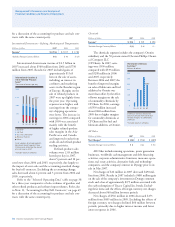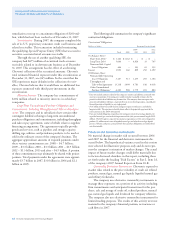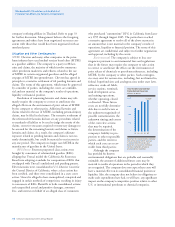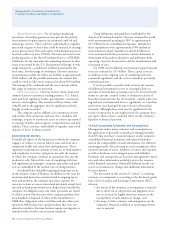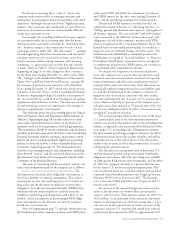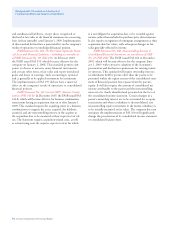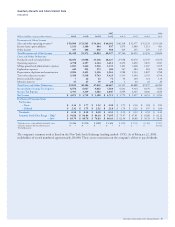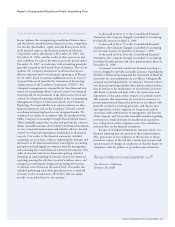Chevron 2007 Annual Report Download - page 46
Download and view the complete annual report
Please find page 46 of the 2007 Chevron annual report below. You can navigate through the pages in the report by either clicking on the pages listed below, or by using the keyword search tool below to find specific information within the annual report.
Management’s Discussion and Analysis of
Financial Condition and Results of Operations
44
company’s refining affiliate in Thailand. Refer to page 33
for further discussion. Management believes the foregoing
agreements and others have been negotiated on terms con-
sistent with those that would have been negotiated with an
unrelated party.
MTBE Chevron and many other companies in the petro-
leum industry have used methyl tertiary butyl ether (MTBE)
as a gasoline additive. The company is a party to 88 law-
suits and claims, the majority of which involve numerous
other petroleum marketers and refiners, related to the use
of MTBE in certain oxygenated gasolines and the alleged
seepages of MTBE into groundwater. Chevron has agreed in
principle to a tentative settlement of 60 pending lawsuits and
claims. The terms of this agreement, which must be approved
by a number of parties, including the court, are confiden-
tial and not material to the company’s results of operations,
liquidity or financial position.
Resolution of remaining lawsuits and claims may ulti-
mately require the company to correct or ameliorate the
alleged effects on the environment of prior release of MTBE
by the company or other parties. Additional lawsuits and
claims related to the use of MTBE, including personal-injury
claims, may be filed in the future. The tentative settlement of
the referenced 60 lawsuits did not set any precedents related
to standards of liability to be used to judge the merits of the
claims, corrective measures required or monetary damages to
be assessed for the remaining lawsuits and claims or future
lawsuits and claims. As a result, the company’s ultimate
exposure related to pending lawsuits and claims is not cur-
rently determinable, but could be material to net income in
any one period. The company no longer uses MTBE in the
manufacture of gasoline in the United States.
RFG Patent Fourteen purported class actions were
brought by consumers of reformulated gasoline (RFG)
alleging that Unocal misled the California Air Resources
Board into adopting standards for composition of RFG that
overlapped with Unocal’s undisclosed and pending patents.
Eleven lawsuits were consolidated in U.S. District Court for
the Central District of California, where a class action has
been certified, and three were consolidated in a state court
action. Unocal is alleged to have monopolized, conspired and
engaged in unfair methods of competition, resulting in injury
to consumers of RFG. Plaintiffs in both consolidated actions
seek unspecified actual and punitive damages, attorneys’
fees, and interest on behalf of an alleged class of consumers
who purchased “summertime” RFG in California from Janu-
ary 1995 through August 2005. The parties have reached
a tentative agreement to resolve all of the above matters in
an amount that is not material to the company’s results of
operations, liquidity or financial position. The terms of this
agreement are confidential and subject to further negotiation
and approval, including by the courts.
Environmental The company is subject to loss con-
tingencies pursuant to environmental laws and regulations
that in the future may require the company to take action
to correct or ameliorate the effects on the environment of
prior release of chemicals or petroleum substances, including
MTBE, by the company or other parties. Such contingen-
cies may exist for various sites, including, but not limited to,
federal Superfund sites and analogous sites under state laws,
refineries, crude oil fields,
service stations, terminals,
land development areas,
and mining operations,
whether operating, closed
or divested. These future
costs are not fully determin-
able due to such factors as
the unknown magnitude of
possible contamination, the
unknown timing and extent
of the corrective actions
that may be required,
the determination of the
company’s liability in pro-
portion to other responsible
parties, and the extent to
which such costs are recov-
erable from third parties.
Although the company
has provided for known
environmental obligations that are probable and reasonably
estimable, the amount of additional future costs may be
material to results of operations in the period in which they
are recognized. The company does not expect these costs will
have a material effect on its consolidated financial position or
liquidity. Also, the company does not believe its obligations to
make such expenditures have had, or will have, any significant
impact on the company’s competitive position relative to other
U.S. or international petroleum or chemical companies.
'
(-''
()''
+''
/''
Year-End Environmental
Remediation Reserves
012 – Year End Environmental
Remed Reserves – v3
(#,*0
'+'* ', '- '.




